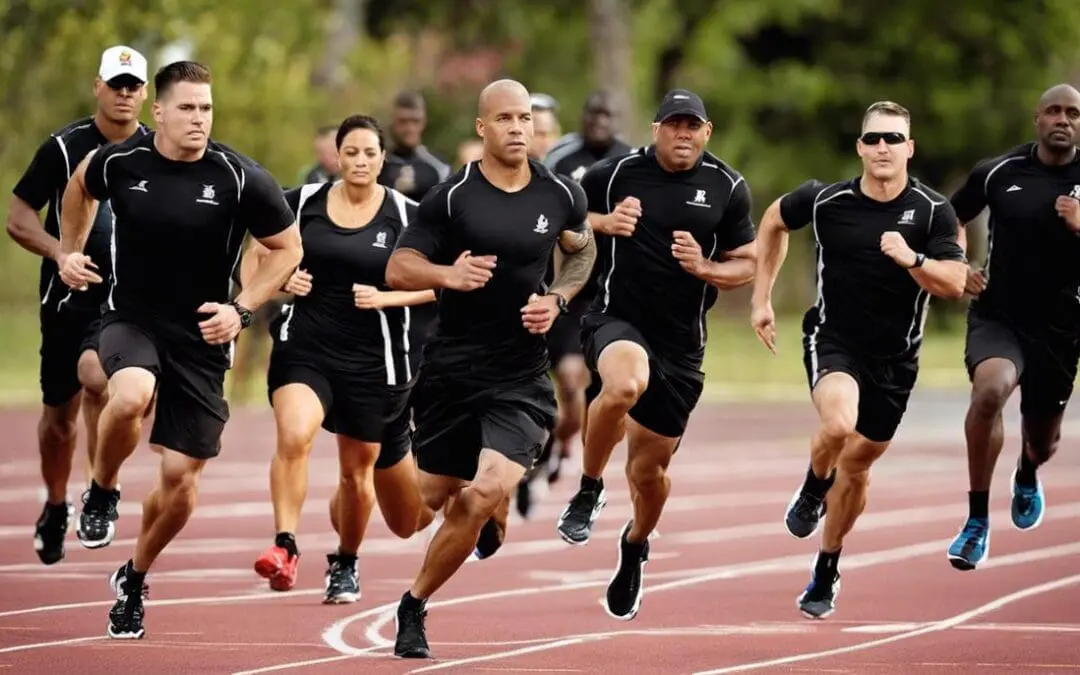High physical fitness standards are a critical element for serving as an Army Warrant Officer. Those in this rank are often exposed to physically demanding endeavors, which necessitate superior physical and mental strength. This essay delves into the world of Army Warrant Officers, looking at their fitness requirements and how these standards ensure officers are prepared for any mission. This written piece also examines how these officers balance demanding family responsibilities while still ensuring they are in peak physical form, shedding light on the significance of mental toughness and the pivotal role it plays in their daily routine. Finally, we will reveal how families can aid their Army Warrant Officer in meeting these rigorous physical and mental standards.
Understanding the Physical Requirements for Army Warrant Officers
As parents, we always hold high hopes for our children, don’t we? Some of us may have ones who’ve announced that they’re considering a career as a Warrant Officer in the United States Army. And, as always, you’re right behind their decision, offering support and arming yourself with useful knowledge that they’re going to need on their journey.
Becoming a Warrant Officer isn’t solely a matter of the mind; it’s crucially about the body too. So, let’s delve into the physical standards set for Army Warrant Officers because, after all, being aware is being prepared!
Firstly, maintaining a high level of physical fitness is a non-negotiable requirement, regardless of the rank they serve. But, for aspiring Warrant Officers, it’s even more critical as they may face different physical challenges related to their areas of technical expertise.
Potential Warrant Officers must pass the Army Physical Fitness Test (APFT) before entering Warrant Officer Candidate School. The APFT includes timed push-ups, sit-ups, and a two-mile run. For male applicants aged 17-21, the standard minimum requirements are 42 push-ups, 53 sit-ups, and a two-mile run in 15 minutes and 54 seconds. Female applicants of the same age must do at least 19 push-ups, 53 sit-ups, and a two-mile run within 18 minutes and 54 seconds.
However, that’s not all. Once the candidate has cleared the APFT, they do not stop training. They must meet or exceed these physical standards consistently throughout their service as a Warrant Officer. This is primarily because the Army relies on these officers to lead, administer, educate, and inspire others while also maintaining their technical prowess.
The Army body composition program also plays into the physical standards. Men and women must meet certain weight and body fat percentage limits. For men aged 17-20, the maximum allowable body fat percentage is 20%, while for women, it’s 30%. These maximums increase with age, but maintaining a recommended weight and body fat percentage is much appreciated.
Before organizing that going-away party, remember to encourage your future Warrant Officer towards a dedicated fitness regime. Emphasize not just on reaching those physical standards, but on consistently maintaining and, if possible, exceeding them. Promote the adoption of a nutritious, balanced diet to assist their exercise regime, and remind them that regular sleep is just as important for their body’s recovery and growth.
Exploring potential career paths with our children is an exciting and vital part of our parenting journey. With the physical standards known for Army Warrant officers, you can now help prepare your child for a challenging, yet rewarding career with the U.S Army. Go ahead, enjoy these moments, and cherish each step! Wishing your family all the joy and pride this new journey will unfold.

Balancing Family Responsibilities with Fitness Goals
Incorporating Fitness within Family Time
One of the smartest ways that Army Warrant Officers can maintain their fitness whilst juggling a busy family life is by intertwining the two. The moments you enjoy with your kids don’t necessarily have to serve as breaks from fitness. Instead, curate enjoyable activities that can serve both purposes without compromising on the fun. Encouraging activities such as biking, hiking, playing ball, or even dancing can be a fun way of keeping everyone engaged and active. This not only helps you maintain your fitness standards but also instills a healthy lifestyle attitude in your children from an early age.
Making the Most of Your Time
The key to having time for everything lies in meticulous planning. Design your schedule in such a way that disruptions to your fitness routines are minimized. For instance, early morning workouts or late evening runs after the kids have gone to bed are great options. Furthermore, ‘mini workouts’ blasted throughout the day such as taking the stairs instead of the elevator, short walks during lunch breaks, or doing squats in your office, can add up over time without taking large chunks out of your day.
Involve Your Partner
If you have a spouse or partner, their involvement can go a long way in helping you strike a balance between family commitments and maintaining fitness. They can take care of the kids when you need to leave for the gym or a run. In the same vein, they can also join you in your workout routines, making it a family event, thereby creating time for both fitness and family bonding.
Fitness Balancing on Deployment
Army Warrant Officers often spend considerable periods away from home due to deployments. This fact of military life doesn’t mean that you can let your fitness slide. One way to work around this is investing in portable workout equipment. That way, you can take your workout with you wherever you get deployed. It doesn’t necessarily require access to a full-fledged gym; sometimes, a good set of resistance bands, a yoga mat, or a pair of sturdy running shoes may be enough to maintain your fitness regimen in different settings.
Fitness is not just about passing the Army Physical Fitness Test. It is about being healthy, physically and mentally, and being prepared for the challenges that come with being an Army Warrant Officer – the most senior of soldiers. So, weave these valuable fitness practices through your everyday life, and see the positive impact on not just your professional life, but on your family life too. Being healthy and fit is a lifetime commitment and those big goals are achieved by taking it one day and one workout at a time!

Mental Toughness and Its Relation to Physical Fitness
Moving on to the next major aspect of training, let’s explore why mental toughness is as significant as physical toughness for Army Warrant Officers. Sure, physical toughness is paramount, which we’ve already noted, but without mental fortitude, even the most physically fit Army Warrant Officer might find it challenging to successfully carry out their role.
Perhaps the most notorious hurdle faced in the Army is stress. Stressful situations come aplenty in all areas of life, but the Army amplifies these potentially traumatic events, with split-second decisions often having life-changing impacts. This is where mental toughness kicks in, equipping officers with the ability to see clear corridors amidst the fog of war, so to speak. Just as you condition your body to withstand strenuous physical demands, your mind, too, must be conditioned to withstand high-stakes, high-pressure scenarios.
Resilience, another crucial element of mental toughness, is the capacity to bounce back from disappointments, and adapt to change swiftly and smoothly, allowing for sustained performance levels. Research has also shown that progression in the Army requires equally strong emotional resilience as it does physical and cognitive abilities.
One prime example of a platform that aims to boost mental resilience amongst army officers is the Army’s Comprehensive Soldier and Family Fitness program. This program aims to provide training to achieve five dimensions of strength – physical, emotional, social, spiritual, and family.
Now, looking more specifically at the Warrant Officers’ roles, it’s a position that often places them in leadership roles where they are required to guide, inspire, and influence their peers and subordinates. Good leaders are often those who can master their emotions, understand the emotions of others, and use this understanding to inspire their team towards their goals. This forms the basis of Emotional Intelligence, a key aspect of mental toughness.
A Warrant Officer who possesses mental toughness will be more likely to make informed, rational decisions. Their ability to remain undaunted amidst obstacles, while inspiring the same resolve in their team, is what sets them apart.
Coupled with physical toughness, mental toughness contributes to the overall “warrior ethos” – the unwavering courage, resilience, and dedication required of Army Warrant Officers. Training both the body and mind increases the chances of not just surviving, but thriving in the challenging world of the U.S. Army.
It’s also important to remember that mental toughness, like physical fitness, is not just developed overnight. It is a continuous journey. The resources available today, from counseling and mental exercises to resilience training courses, are all part of the efforts aimed at increasing mental toughness.
So, if your child, your partner, or you are contemplating a rewarding career as a Warrant Officer, remember the importance of mental toughness. Just as you would hit the gym or the track to work on your physical fitness, dedicate time to cultivate and maintain your mental strength as well. Building both physical and mental toughness will not only make you a stronger individual, but it will also make you a better leader and an inspiration to your team. And isn’t that exactly what the Army needs?

Helping your Army Warrant Officer Meet Fitness Requirements
Building on the essential role of family support in a warrant officer’s physical fitness journey mentioned in the first part of the article, it’s equally important to delve deeper into what that support entails. Families are part of their loved one’s military journey in more ways than they can imagine.
Communication is crucial in any relationship, and this stands true even in the realm of fitness support. Keeping lines of discussion open about the warrant officer’s fitness goals, challenges, and progress can provide the moral support that’s often overlooked, yet vital. Family members don’t necessarily need to be fitness experts, but a listening ear can do wonders.
Family members can also partake in learning more about the fitness standards set by the army. This understanding will not only help them be more participative in their loved one’s fitness journey but will also signify their commitment towards the warrant officer’s career and personal development. There’s something incredibly empowering about having the loved ones truly grasp the depth and breadth of the fitness expedition the warrant officer is on.
Over and beyond communication and understanding, one of the strongest avenues of family support lies in setting a health-conscious environment at home. This involves cultivating wholesome dietary habits that align with the warrant officer’s nutritional needs. Families can also strive to create a stress-free home atmosphere conducive to restful sleep. Both these elements play a significant role in fitness recovery and progress.
Additionally, demonstrating enthusiasm towards the warrant officer’s fitness routine encourages them to stick to it. Simple gestures such as cheering them on during home workouts, showing interest in their progress, or even joining them occasionally can be a significant morale booster.
In the same spirit, families can assist warrant officers in managing their fitness schedule. Balancing a demanding role in the army with stringent fitness requirements can be stressful. An offering of assistance in managing these tasks exemplifies love, support, and teamwork within the family, effectively reducing the warrant officer’s stress levels.
Finally, families can be proponents of mental well-being, a crucial yet sometimes ignored aspect of overall fitness. Encouraging open conversations about mental health, applauding resilience in the face of challenges, and emphasizing the importance of emotional intelligence can equip warrant officers with the indispensable armor of mental toughness. Reminding them of the warrior ethos and consistently supporting their journey towards developing mental toughness, are golden threads in the fabric of a supportive family.
In essence, a family’s role in supporting a warrant officer’s fitness standards doesn’t merely revolve around physical fitness. It encapsulates a broader spectrum, ranging from offering moral support, encouraging a healthy and balanced lifestyle, managing stress levels, and championing mental toughness. Through this collective effort, families can indeed be the cornerstone in a warrant officer’s journey to meeting their physical fitness standards.

The role of an Army Warrant Officer is no small feat and achieving the required physical fitness, maintaining family responsibilities, and showing extreme mental toughness aren’t separate battles but interconnected elements of this complex role. Each aspect feeds and fortifies the others, fostering an environment of continuous self-improvement. A supportive and understanding family plays a critical role in this journey, acting as an officer’s rock and encouraging them to reach their fitness goals. As we’ve seen, remaining eligible to be a Warrant Officer isn’t just about maintaining a certain physical state but harmonizing one’s professional responsibilities, mental grit, and personal life.


